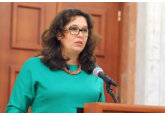
Moldova plans to introduce a mechanism for civil confiscation of property.
The Ministry of Justice has developed a bill on civil forfeiture, which is designed to protect the interests of the state and society from corruption, organized crime, money laundering and terrorist financing by preventing and limiting criminal activity. The law provides for the introduction of a mechanism for civil confiscation of property, stipulates the legal justification for its application, the conditions for the initiation and implementation of the civil confiscation procedure. Civil forfeiture is the forced or free transfer of a person's property to the government in situations where a court finds reasonable grounds to believe that the goods did not come from lawful sources. Civil confiscation will be applied if a difference is detected between the income and property of the subject in the amount of more than 20 average salaries in the economy. The subjects of civil confiscation will be persons convicted, accused or suspected of committing crimes under certain articles of the Criminal Code, unless extended confiscation has previously been applied to them. Also, civil forfeiture will be able to be applied to persons who were found suspected or accused of committing a number of criminal offenses, but the criminal investigation was terminated, closed or withdrawn from criminal prosecution, but as part of the criminal investigation, the property of these persons was seized in order to ensure possible special and/or extended confiscation. Also, civil confiscation can be applied to family members of these persons or persons associated with them. The object of civil confiscation will be financial assets, any category of tangible or intangible, movable or immovable assets, as well as documents or other legal acts in any form, including electronic or digital form, certifying ownership or other right, including any share in these values (assets). The bill establishes a list of entities that have the right to apply to the court to initiate civil confiscation. The statute of limitations, the procedure for conducting a financial investigation, the rights and obligations of the parties, procedures for executing court decisions, etc. are also stipulated. A civil forfeiture judgment is sent to the Arbitration Recovery Agency (ARBI) or the National Integrity Authority (ANI), and the State Tax Service will enforce the judgment. //12.09.2023 – InfoMarket.







